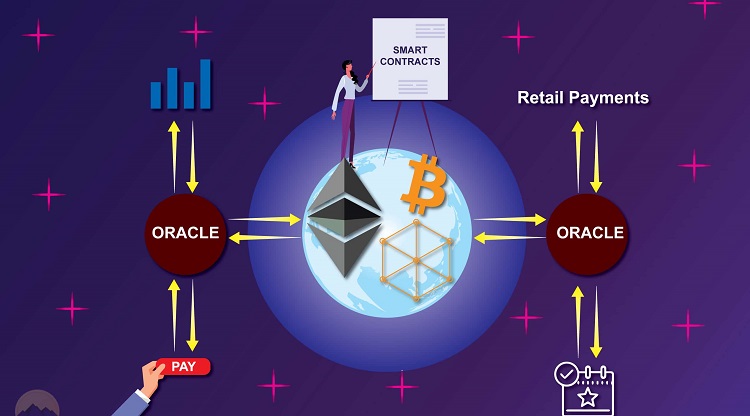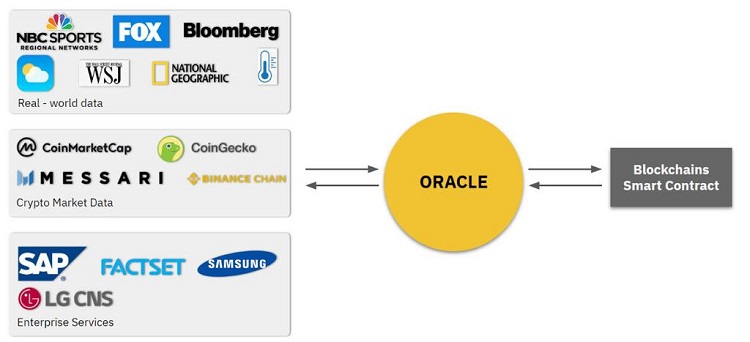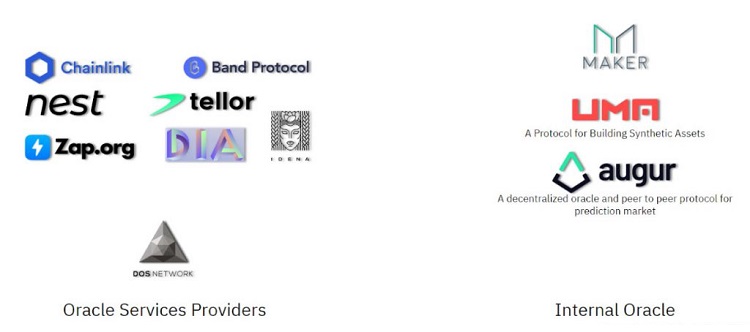Oracle is an information technology term used to refer to large database management systems. However, Oracle in crypto carries a different meaning as it is built upon blockchain technology. If you’re still unclear about what Oracle is in Blockchain, how Oracle operates, along with some potential Blockchain Oracle projects, then you should read the detailed information right below.
Contents
- 1 What is Oracle in Blockchain?
What is Oracle in Blockchain?
What is Oracle in Blockchain?
Suppose Andrew and Anna want to bet on the outcome of a horse race. The bet is 100 USD, secured by a smart contract, with Andrew betting 50 USD on team X and Anna betting 50 USD on team Y. How does the smart contract know whether to give the money to Andrew or Anna when the match ends?
=> The solution is to have an Oracle mechanism to retrieve accurate off-chain results and securely and reliably distribute them to the blockchain. If team X wins, through Oracle, the smart contract will transfer the money to Andrew and vice versa, if X loses, the smart contract will send the bet amount to Anna.
Oracle in Blockchain provides the Web 3.0 ecosystem with a method to connect with existing legacy systems, data sources, and advanced computations.

What problem does Oracle in blockhain solve?
The main limitation of smart contracts is that they cannot connect to external data outside their native blockchain system in any way.
External data are called off-chain, while data recorded on the blockchain is known as “on-chain.”
Blockchains achieve strong consensus on the authenticity of transactions by intentionally isolating themselves from external systems, such as preventing attacks, eliminating double spending, or reducing network downtime. To safely interact with off-chain systems outside the blockchain and bridge the gap between the two environments, blockchain will need an additional infrastructure component called “Oracle.”
Many use cases for smart contracts, like DeFi, require knowledge of real-world data or events occurring off-chain. Oracle plays a crucial role in addressing this issue by providing a common gateway for external data into the blockchain while maintaining the normal operations of the blockchain and its security.

3 main types of information that Oracle brings into the blockchain
There are three basic types of information that Oracle systems in crypto bring into the blockchain:
-
Crypto Market Data: Information about daily price movements of coins/tokens is off-chain data that needs to be brought into the blockchain. For example, extracting information from Coinmarketcap or Coingecko into a blockchain that has features related to coin/token transactions.
-
Enterprise Services: These are data that serve the operations of a business. If a business wants to implement blockchain into its operations, it will need a solution to integrate real-world data into the blockchain, which also requires the assistance of Oracle.
-
Real World Data: Real-life data that can be incorporated into blockchain, such as temperature, match results, weather, etc.
Current types of Oracles in blockchain
With a wide range of off-chain resources, Oracles have various features and purposes to provide information to the blockchain. Smart contracts require not only different types of external data and computations but also various distribution mechanisms with different levels of security.
Input Oracles
Input Oracles can be understood as providers of input data and are the most widely recognized type of Oracle today. Input Oracles take real-world (off-chain) data and bring it onto the blockchain network for use in operating smart contracts.
A typical example of Input Oracles is Chainlink (LINK) – the leading Oracle solution currently, providing smart contracts in DeFi with online access to financial market data.
Output Oracles
Conversely, Output Oracles have the function of extracting data from the blockchain to the outside, allowing smart contracts to send commands to off-chain systems to trigger certain actions.
For example: smart contracts through Oracle inform a bank to make a payment or request a data storage service provider to perform data storage according to a contract, or ping an IoT system to unlock a car door after an on-chain rental payment is made.
Cross-Chain Oracles
Cross-Chain Oracles are understood as cross-chain Oracles, allowing them to read and write information between different blockchains. They facilitate interaction for moving both data and assets between blockchains, such as using data on one blockchain to trigger an action on another blockchain’s chain or connecting assets across multiple blockchains so they can be used outside their original blockchain.
+ Oracle Service Providers: Different blockchains will extract data from Oracle Service Providers to perform functions for their blockchain.
Examples include Chainlink, Band, WINkLink, Pyth, Tellor, Dia, Nest, Zap, etc.
+ Internal Oracle: These are blockchains that develop their own Oracle solutions to serve the needs of their specific blockchain project.
An example of this type of Oracle is UMA, Maker and Augur

Top 3 Leading Blockchain Oracles 2025
Chainlink (LINK)
Chainlink is currently the largest blockchain Oracle, built on the Ethereum network with high security and flexibility. Chainlink provides essential off-chain data feeds for complex smart contracts operating on the blockchain.
Chainlink seamlessly integrates real-world data sources into on-chain smart contracts. Additionally, Chainlink currently secures over $14 billion from top decentralized protocols such as Aave, Compound, Venus, and other DeFi protocols.
=> Learn more: What is Chainlink (LINK), and should you invest in it?
Universal Market Access (UMA)
UMA is another highly-rated decentralized Oracle project you might be interested in. UMA stands for Universal Market Access. UMA enables users to create various synthetic assets on the Ethereum blockchain.
UMA primarily focuses on the decentralized financial derivatives market. The protocol aims to democratize the derivatives sector on the blockchain and remove barriers to enable global investor participation.
WINklink (WIN)
WINkLink is the first complete Oracle project built on the TRON ecosystem. This decentralized Oracle network ensures the security of smart contract execution by linking the real world with the blockchain space.
Additionally, WINkLink aims to relay trustworthy and verifiable data feeds. It achieves this using its WIN token.
What are the drawbacks of Oracle in Blockchain?
Oracles require trust, as the data sources Oracles use to fetch and transmit information to smart contracts must be reliable. If the data provided by smart contracts to Oracles is flawed, security concerns arise regarding the validity of the smart contracts being executed. A remedy for this is to request data from multiple Oracles instead of a single Oracle. Smart contracts can also be programmed not to execute if the two parties involved do not agree.
Above is the information about what is an Oracle in blockchain and current potential Oracle projects. If you have any questions related to Oracle in blockchain, feel free to leave a comment to get an answer within 24 hours.


























